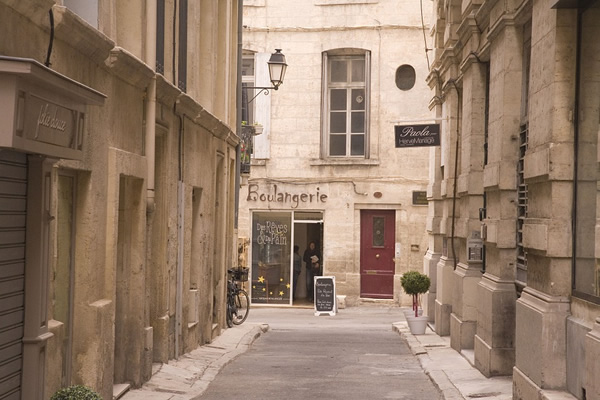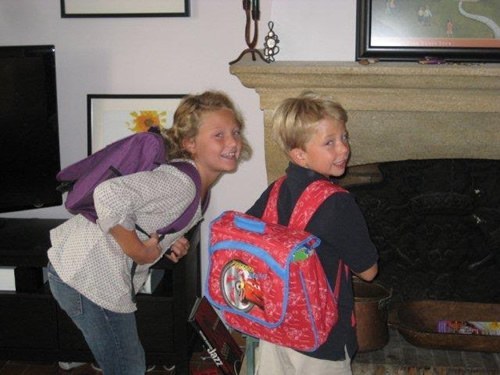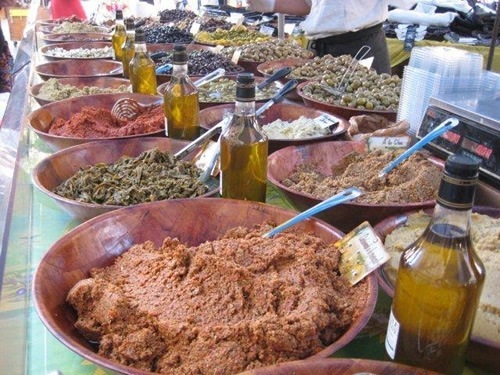The Dream and Reality of Life in the South of France
By Aidan Larson
 |
| A Boulangerie at the end of a street in the old town of Montpellier in the south of France. |
It began some years ago on our honeymoon, this dream of visiting the South of France and living here too; a rich life with children, good food, a new language, and all the romantic notions about France itself.
When you think of France, what pops into your mind? Is it the wine, cheese, food, or 35-hour work week? France has a universal reputation for all of the above and more. And that reputation is still largely justified. The French take some things very seriously — food and a certain way of life. Their language is extremely important to them and for a good reason. It is a beautifully complex and nuanced language that adds a lyrical touch to the everyday.
These were our reasons for wanting to live here. And thankfully, what we've found hasn't disappointed us; instead, the friendliness and encouragement have been more than expected. The idea of the French being arrogant and elitist does not ring true in the South of France. Perhaps you will find such attitudes in Paris, but Paris is, after all, one of the world's largest cities. For the most part, we have found kindness in all our dealings with people, even with the scant knowledge use of the language.
And now here we are — a family of five living on the outskirts of Montpellier's culturally and intellectually stimulating city, the seat of the Languedoc-Roussillon region. It is a university town with all the richness and buzz of youth while retaining its southern French charm. The men still come out for their afternoon-long matches of "boules," schools and businesses have two hours for lunch, and all stores, other than a few grocery stores open until noon, are closed for business on Sunday.
Children and School
Our children are young, ages eight, six, and two, the perfect age for such an adventure. We decided that to put them in a bilingual or English school would be a mistake if we wanted to truly live here and give them the gift of another language while their brains were still open to absorbing one. We did not make this decision overnight, nor was it without its share of worry. I worried about all the things that perhaps you would worry about too; would they be happy, would they learn anything or be left behind in the curriculum because of the language, would the children make any friends, would they come home crying, discouraged and lonely, would they hate me forever for doing this to them?
I am happy, well, more than satisfied. I am thrilled that none of these worries has been remotely near to the reality of the experience. If I can offer anyone just one piece of advice, it is this: children are resilient, and they will be happy if they feel loved, valued, and supported. My children have truly amazed me, and I know they are not unique in how they've taken to another culture and language. Of course, it helps that our local school is friendly and the teachers are warm and welcoming, but I can't believe that is unique to my experience.
 |
Two of the author's children sporting backpacks for school.
Photo by Aidan Larson. |
French Public Schools
You will hear horror stories about French public schools. The teachers have an unmerited reputation that they never praise, do not use positive reinforcement, and always push harder on matters that might seem ridiculous to the average American public school family.
I have found that my children's French teachers are serious about their jobs and the progress of their students and so push them to excel. Teachers offer specific and detailed encouragement. Some things that may seem silly to some expatriates but are of tantamount importance in France, such as handwriting, are taken seriously because they are an aspect of the child's daily school life. It is a foundation for attention to detail, respect for learning, and pride in one's work. The difference in my 6-year-old son's handwriting has been more than impressive since moving here. He writes beautifully and in perfect French script — a cross between our cursive and calligraphy — and while this may perhaps serve no purpose in later "life," it serves him well at school because he has improved, feels accomplished, practices motor skills and control, and earns "très bien" ("very good") compliments for his work.
Learning French
You would think that because we had dreamed of a life in France for 13 years, we would be fluent in French. Or at least that we would have studied French in college. If nothing else, we would have brushed up on the basics we had learned from high school with a dictionary or a computer course. But we had not. When we moved here nearly one year ago, I had no knowledge of French other than counting the numbers to ten, a few colors, and key phrases, mostly about navigating a menu and communicating at restaurants.
Was I silly? Was I scared? No, and yes. I began French lessons as soon as we arrived and have been able to piece together enough to get by through many things, from enrolling the children in school to ordering a Thanksgiving turkey from the butcher. Daily school collections, French television, 3rd-grade French homework, and two big kids who rattle away in French while playing "l'ecole"' have buoyed me and pushed me to get out there and dare to speak. At times it can be frustrating, isolating, and lonely, but the excitement and thrill of learning a new language more than make up for any of the negatives.
The Pleasure of Food Rituals in France
 |
| Salads, olives, olive oil and other tastes in a stall of one of the many markets in the south of France. Photo by Aidan Larson. |
I can only write about life in France if I mention the food. It is such an integral part of the culture and lifestyle that I have to address the matter. Eating is viewed much differently here than in most Anglophone countries. For starters, there are few fast food restaurants. Yes, there are some, one very famously American where children and teenagers all love eating, but in general, the big meals you eat as a family at home, usually for lunch, and always seated, served in courses and savored. Eating is a communal experience where time is always spent talking, relaxing, and nourishing. The food is simple but primarily seasonal and freshly prepared.
Breakfast is small. Lunch is the most substantial. There's an early afternoon snack mostly for children called a "gouter"' (to taste), and then dinner is on the small side and served after 7 p.m. There is very little snacking in between meals, especially by women. Most lunches consist of at least three courses — entrée, plat, cheese, yogurt, and fruit. If it is the weekend, there will always be wine but never more than a couple of glasses. Excess is not the way to go in France, with quality over quantity being the norm.
I do have to say a word about chocolate, though. An impressive array of chocolate cereals, candy, cookies, and baked goods is everywhere. And chocolate milk is a mainstay served warm and in bowls for slurping. Children eat most of these items for their snacks in the afternoon. A vast quantity of chocolate is enjoyed here, yet somehow very little trouble with childhood obesity.
School Lunches
One final note on food, my favorite subject is the quality of school lunches. Each day from noon to two (there's no school on Wednesday), the cafeteria or "cantine" serves lunch. Children can stay at school or come home for a 2-hour break. Mine love staying because school lunches are so good, so much better than what I can prepare in the middle of the day. The children are all seated and then served at their table. There are four courses, real plates, napkins, and flatware, and they can raise their hands for seconds. My emergent foodie daughter was beyond delighted. Usually, the first course is a salad, beets or radishes, pasta, or greens. Then they have their main course, my kids' favorite is veal cordon bleu and peas, followed by the cheese course, which can be yogurt on some days and then finished with a dessert such as chocolate mousse, fruit, or applesauce. You can imagine what their favorite dessert might be.
Imagine eating like this at school, having sit-down meals ingrained in you from school age, learning table manners properly, and eating well as part of your school day. The food rituals go a long way in explaining why the French are the way they are about meals and food. It is a life lesson that I am pleased for my children to learn.
Living in the South of France is a reality that sometimes feels like a dream. There are frustrations and complaints the same as anywhere. They are just different ones. At times it is lonely and tiring to be on the edge of such a rich foreign culture and language, but the warmth and encouragement of the people here have surprised me. They continue to support and engage our family with patience and no small amount of curiosity.
More Info on Living in the South of France
The Mediterranean Sea is close by, and while too calm for surfing, its beaches are perfect for a family day. In the summer, seasonal restaurants called paillotes are erected on the beach and vary in price and formality with lounge chairs and beachside service.
As it is close to the Spanish border, the region has a culture of bullfighting and cowboys. They don't kill the bulls here but have bull runs and festivals during the summer at local arenas where bullfights end, rather than in the bull's death, in the bullfighter jumping into a pool of water. These are called "toro piscine," or bull swimming pools.
For now, the region produces the most wine in France and is also the least expensive. The popularity and quality of Languedoc wines are on the rise, so I advise getting good vintages now while prices are still reasonable. A well-known vineyard in the area is Peuch-Haut, and their reds are delicious.
Having over 300 days of sunshine a year means there is always a supply of outdoor adventures. You can hike, bike, ride horses or walk, take the car, and meander through the Pic St Loup wine area, stopping off at whichever vineyard strikes your fancy. The proprietors are happy to let you taste, and you can leave with a bottle of two for your collection.
Boules, the retired French man's favorite pastime, is alive and well here. Every day the men, and sometimes their wives, come to the park across the street carrying their small bag of three metal balls. It is like horseshoes and curling combined. These men spend hours after lunch, throwing their metal spheres underhanded, trying to get theirs closest to the marker, and if not, trying to knock someone else's further away.
For more information, check out the Montpellier’s tourism office and International Living in Montpellier as an Expat sites.
|
Aidan Larson is an American mother of three navigating her way through her family’s new life in France.
|
